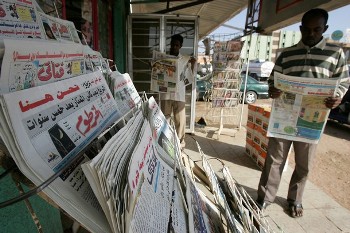Sudanese parliament pass new press law
June 8, 2009 (KHARTOUM) – After months of controversy and protests, the Sudanese federal parliament on Monday approved a new press law removing heavy sanctions on journalists but keeping censorship.

The initial version allowed the regulatory body to impose heavy fines of up to 50,000 Sudanese pounds (21,500 US dollars) for unspecified offences. Also the Press Council had the power to close definitively newspapers.
Under the new press law, the court will fix the penalty if they found guilty of violating the law. Also, the press council is invested only to close down newspapers for three days. Otherwise, law courts decide penalties and can choose how long to suspend newspapers.
More than 50 Sudanese journalists protested outside the National Assembly in Omdurman against a draft law of press largely criticized for repressive articles it includes on Tuesday May 19 when the parliament begun to discuss the bill.
There are some 30 newspapers in both English and Arabic published daily to represent all persuasions – pro-government, Islamist or communist – and show off the country’s multi-faceted political make-up.
The journalists complain since last year against daily censorship imposed by the Sudanese security, their protests were mainly directed against the security agents who play the role of editor in chief every night and seize printed newspapers or decide to close it.
However, the new law does not remove the power from intelligence services who can censor papers ahead of publication under Sudan’s National Security Act.
“There shall not be imposition of restrictions on freedom of press publication except according to law in issues pertaining to safeguarding the national security and public order and health,” provides the new law.
A draft of a new national security law is currently being studied, in what is considered a sensitive move ahead of a general election in February 2010.
(ST)

Ambago
Sudanese parliament pass new press law
The Sudanese parliament’s bold move in passing the new press law is one step forward in the democratization process as promised in the Comprehensive Peace Agreement (CPA).
However since the signing of the peace truce it has sadly enough met a lot of reluctance from the National Congress Party of President Al Bashir to implement it to the sprit and letter.
The NCP is still fighting its survival war in Darfur and at the same time its collusion with the Sudan People’ Liberation Movement (SPLM) has also been a turbulent one. But what we are yet to know is to as whether the turbulent relation between the two partners is a cause or a result of the delay in implementing the CPA?
The new law states that,” There shall not be imposition of restrictions on freedom of press publication except according to law in issues pertaining to safeguarding the national security and public order and health,”
Also the new law does not remove the power from intelligence services who can censor papers ahead of publication under Sudan’s National Security Act.
Of course as we can be seen the new law still fails to incorporate the principles of the freedom of press as stipulated in the CPA. The agreement demands as well a review in the National Security Act, because it is this government organ that is used to repress the freedom of the citizens and thus hindering any democratic transformation in the country.
Earlier President Al Bashir accused the SPLM of running the South with Intelligence laws while he forgets to recognize the fact that the North itself has become a police state under his security agents especially following the ICC arrest warrant.
As we understand it, a draft of a new national security law is currently being studied, in what is considered a sensitive move ahead of a general election in February 2010.
We hope that the new security law will come in line with the spirit of the CPA and only then can we expect reasonably fair and democratic elections in 2010 to be followed by the referendum in 2011.